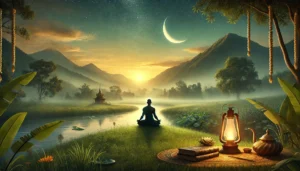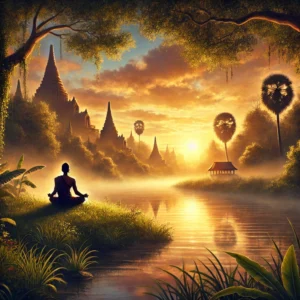
Benefits of waking up during Brahmamuhurta
Brahmamuhurta: Why Ancient Wisdom Warns Against Late-Night Sleep
The concept of Brahmamuhurta is deeply rooted in the spiritual and philosophical traditions of ancient India. Revered as the most auspicious time of the day, it is believed to be ideal for meditation, spiritual practices, and self-reflection. However, with modern lifestyles marked by late-night work, entertainment, and socializing, the significance of Brahmamuhurta is often overlooked. Ancient wisdom warns against staying awake late at night, as it disrupts not only our physical health but also our spiritual growth. In this comprehensive exploration, we will delve into the spiritual and physical benefits of waking up before sunrise, the adverse effects of late-night sleep, and practical ways to incorporate this ancient practice into contemporary life.
Understanding Brahmamuhurta
The term Brahmamuhurta translates to “the time of Brahma,” the creator in Hindu philosophy. This period begins roughly 96 minutes (two muhurta) before sunrise and lasts for about 48 minutes. It is characterized by its calm and serene atmosphere, untouched by the noise and distractions of the day.
According to Ayurveda and yogic sciences, Brahmamuhurta is the time when the environment is imbued with Sattva, the quality of purity, balance, and harmony. The body’s energy levels and the mind’s capacity for focus and introspection are at their peak during this time, making it ideal for practices such as yoga, meditation, prayer, and scriptural study.
In Charaka Samhita, an authoritative text on Ayurveda, it is said:
“Brahmamuhurta uttishthet swastho rakshartham aayushah”
(One should rise during Brahmamuhurta to protect and promote longevity and health.)
Table of Contents

Benefits of waking up during Brahmamuhurta
Spiritual Benefits of Waking Up During Brahmamuhurta
1. Heightened Spiritual Connection
The quietude of Brahmamuhurta allows for a deeper connection with the divine. Meditation and prayer during this time are believed to open channels to higher spiritual dimensions. Saints, sages, and yogis have long emphasized the transformative power of practices conducted during this sacred hour.
2. Clarity of Mind
In the early hours of the day, the mind is naturally free from the clutter of thoughts and distractions. This clarity makes it easier to focus on spiritual practices, set intentions for the day, and engage in self-reflection.
3. Increased Prana (Life Energy)
Brahmamuhurta is associated with an abundance of prana, the vital life force in the atmosphere. Breathing exercises and meditation during this time enhance the flow of prana in the body, revitalizing both the mind and soul.
4. Harmonizing with Universal Rhythms
Ancient wisdom emphasizes living in sync with nature’s cycles. Rising before sunrise aligns the human body and mind with the rhythms of the universe, fostering a sense of inner peace and equilibrium.
5. Enhanced Learning and Memory
The calm mind during Brahmamuhurta is ideal for studying sacred texts, chanting mantras, or reflecting on philosophical teachings. The memory is sharp, and the ability to retain knowledge is heightened during this period.
Physical Benefits of Waking Up Early
1. Boosted Mental Health
Scientific studies align with ancient wisdom, demonstrating that early risers tend to experience lower levels of stress and anxiety. The peaceful morning hours provide a fresh start, allowing individuals to approach the day with a calm and focused mindset.
2. Improved Sleep Quality
Going to bed early and waking up during Brahmamuhurta promotes a healthier sleep cycle. This alignment with the body’s natural circadian rhythm ensures deep and restorative sleep.
3. Enhanced Digestion and Detoxification
Ayurveda explains that the body’s detoxification processes peak during the early morning hours. Waking up early supports optimal digestion, metabolism, and the elimination of toxins, contributing to better overall health.

Benefits of waking up during Brahmamuhurta
4. Increased Physical Vitality
Engaging in yoga, stretching, or light exercise during Brahmamuhurta energizes the body and enhances blood circulation. This early movement awakens the muscles and prepares the body for the activities ahead.
5. Better Hormonal Balance
Rising early and aligning with natural light cycles regulate the production of hormones like cortisol (the stress hormone) and melatonin (the sleep hormone). This balance plays a crucial role in maintaining physical and emotional well-being.
Why Ancient Wisdom Warns Against Late-Night Sleep
Staying awake late into the night has become a common practice in modern times, whether due to work, entertainment, or social media. However, this habit disrupts the harmony between the body and nature, leading to adverse effects on health and spirituality:
1. Mental Exhaustion
The mind becomes overworked and fatigued from excessive late-night stimulation. This mental clutter impairs focus and reduces the effectiveness of practices like meditation and self-reflection.
2. Circadian Rhythm Disruption
Late-night activities throw off the body’s internal clock, or circadian rhythm, which governs essential biological processes. This misalignment can lead to sleep disorders, poor digestion, and chronic fatigue.
3. Weakened Immunity
The body’s repair mechanisms, including cellular regeneration and immune function, are most active during early night sleep. Staying awake late interferes with these processes, weakening the immune system over time.
4. Increased Stress and Anxiety
Irregular sleep patterns and insufficient rest elevate stress levels, leading to emotional imbalance and difficulty coping with daily challenges.
5. Reduced Spiritual Awareness
The distractions and overstimulation of late-night activities cloud the mind, reducing its receptivity to spiritual insights and higher consciousness.

Benefits of waking up during Brahmamuhurta
Practical Steps to Embrace Brahmamuhurta in Modern Life
For those seeking to incorporate Brahmamuhurta into their daily routine, small, gradual changes can make the transition easier:
1. Establish a Sleep Schedule
Aim to go to bed by 9:30 or 10 PM and wake up around 4:30 AM. Consistency in sleep timings helps the body adjust to this new rhythm.
2. Create a Relaxing Evening Routine
Wind down your day with calming activities like light reading, meditative breathing, or listening to soothing music. Avoid stimulating activities and heavy meals before bedtime.
3. Digital Detox
Minimize screen time at least an hour before bed. Blue light from devices disrupts the production of melatonin, making it harder to fall asleep.
4. Start Gradually
If waking up during Brahmamuhurta feels daunting, begin by setting your alarm 15 minutes earlier than usual. Gradually adjust your schedule to wake up closer to Brahmamuhurta.
5. Engage in Morning Rituals
Use the quiet hours of Brahmamuhurta for activities like meditation, yoga, journaling, or reading scriptures. These practices set a positive tone for the day ahead.
A Gateway to Holistic Well-Being
Brahmamuhurta is not merely an ancient tradition; it is a timeless practice that holds the key to holistic well-being. By aligning our routines with this sacred period, we can unlock profound physical, mental, and spiritual benefits.
In a world increasingly disconnected from nature, the wisdom of Brahmamuhurta offers a powerful reminder of the importance of harmony—within ourselves and with the universe. Waking up before sunrise is not just a habit; it is a pathway to reconnecting with the eternal rhythms of life, fostering health, peace, and enlightenment.
Let Brahmamuhurta inspire you to rise early, reflect deeply, and embrace the fullness of life, as envisioned by the sages of ancient India.
Here’s the FAQs on Brahmamuhurta: Why Ancient Wisdom Warns Against Late-Night Sleep
- What is Brahmamuhurta?
Brahmamuhurta is the pre-dawn period, lasting roughly 1 hour 36 minutes (96 minutes) before sunrise, as defined in ancient Hindu and yogic traditions. The term translates to “The Creator’s Hour” (Brahma = the creator, Muhurta = time period). This period is considered highly auspicious for spiritual, intellectual, and physical activities.
During Brahmamuhurta, the atmosphere is pure, the mind is calm, and the environment is free from worldly disturbances, making it the ideal time to meditate, chant mantras, or study sacred texts. In Ayurveda, it is also described as the time when vata dosha dominates, promoting clarity and movement of energy.
- Why does ancient wisdom emphasize waking up during Brahmamuhurta?
Ancient sages recognized the harmony between the human body and natural cycles. Waking up during Brahmamuhurta is believed to synchronize the body with nature’s rhythms, enhancing well-being. This period offers:
Mental Clarity: The mind is naturally sharp and less distracted.
Spiritual Awakening: The stillness of early morning fosters deeper connection with the self and the divine.
Health Benefits: Aligning the body’s rhythms with nature prevents dosha imbalances, as explained in Ayurveda.
- How does late-night sleep affect Brahmamuhurta practices?
Staying awake late at night disrupts the body’s natural clock (circadian rhythm) and leads to waking up late, often after sunrise. This has several consequences:
Missed Spiritual Opportunities: The calming energy of Brahmamuhurta is lost.
Lethargy and Fatigue: Late-night habits often lead to insufficient sleep, causing tiredness.
Health Problems: Long-term late-night habits can lead to stress, digestive issues, and hormonal imbalances.
- What are the spiritual benefits of waking up during Brahmamuhurta?
Meditative Focus: The quiet atmosphere enhances concentration, making it ideal for meditation or chanting.
Inner Awareness: Practices during this time increase self-awareness and spiritual growth.
Divine Connection: Scriptures like the Yoga Sutras state that this period is perfect for connecting with the higher self or divine energy.
Improved Intuition: Many practitioners report heightened intuition and insights when meditating during Brahmamuhurta.
- Are there health benefits associated with waking up early for Brahmamuhurta?
Yes, modern and ancient insights agree on the health benefits:
Better Digestion: The body’s metabolic system functions optimally in sync with natural light cycles.
Hormonal Balance: Waking early helps regulate hormones like cortisol (stress hormone) and melatonin (sleep hormone).
Reduced Stress: The peaceful atmosphere reduces anxiety and improves emotional health.
Enhanced Productivity: Starting the day early boosts energy levels and focus.
- What do scriptures say about late-night habits?
Sacred texts like the Ayurveda, Manusmriti, and Yoga Sutras warn against the habit of staying awake late into the night. They suggest that nighttime is designed for rest and rejuvenation, while early morning is reserved for spiritual and intellectual pursuits.
Bhagavad Gita (Chapter 6.16) states: “Neither too much sleep nor too much wakefulness is conducive to yoga.”
Ayurveda attributes late-night habits to aggravation of vata dosha, leading to stress, insomnia, and physical imbalances.
- Can modern science validate the concept of Brahmamuhurta?
Yes, modern science supports many of the principles associated with Brahmamuhurta:
Circadian Rhythms: Waking early aligns with the body’s internal clock, promoting better health.
Brain Activity: Studies show that the brain is most productive and focused in the early morning hours.
Mental Health: Early risers often experience reduced stress, better mood regulation, and increased life satisfaction.
- How can one transition to waking up during Brahmamuhurta?
Transitioning to waking up early requires consistent effort:
Gradual Adjustments: Shift your bedtime earlier by 15 minutes each night until you can wake up before Brahmamuhurta.
Avoid Late-Night Stimulants: Limit caffeine, heavy meals, and screen time in the evening.
Set a Morning Intention: Plan meaningful activities like meditation, yoga, or journaling to motivate early rising.
Consistency: Maintain a fixed sleep and wake schedule, even on weekends.
- Is waking up for Brahmamuhurta suitable for everyone?
While waking up for Brahmamuhurta is highly beneficial, it might not suit everyone, especially those with:
Night Shifts: People working irregular hours should prioritize adequate sleep first.
Health Issues: Those with medical conditions requiring longer sleep should follow a physician’s advice.
For such individuals, dedicating any quiet, uninterrupted time for spiritual practices can still be beneficial.
- What activities are recommended during Brahmamuhurta?
To fully utilize Brahmamuhurta, consider these practices:
Meditation: Deepen your spiritual awareness and calm the mind.
Pranayama (Breathing Exercises): Revitalize your energy and cleanse the mind-body connection.
Scriptural Study: Read sacred texts like the Bhagavad Gita, Upanishads, or Vedas.
Yoga: Physical postures and stretches awaken the body and balance energy.
Japa or Mantra Chanting: Repeating sacred mantras enhances spiritual vibration.
Journaling: Reflect on thoughts, emotions, and goals to start the day positively.
- What are the consequences of ignoring Brahmamuhurta?
Ignoring Brahmamuhurta can have spiritual, mental, and physical repercussions:
Physical Consequences: Reduced energy levels, poor digestion, and hormonal imbalances.
Mental Consequences: Increased stress, anxiety, and difficulty concentrating.
Spiritual Consequences: Missing the opportunity to connect with higher consciousness and develop inner peace.
- How does Brahmamuhurta contribute to overall well-being?
Brahmamuhurta encourages holistic living by aligning the body, mind, and soul with natural rhythms. By dedicating this time to spiritual and self-care practices, individuals experience:
Physical Vitality: Improved immunity, digestion, and hormonal balance.
Mental Clarity: Greater focus, creativity, and emotional resilience.
Spiritual Growth: Deepened connection with the divine and heightened self-awareness.

Benefits of waking up during Brahmamuhurta
Summary
Brahmamuhurta: Why Ancient Wisdom Warns Against Late-Night Sleep
Brahmamuhurta, a period approximately 1.5 hours before sunrise, holds immense significance in ancient Indian wisdom. It is revered as the ideal time for spiritual practices like meditation, yoga, and study, as the mind is calm, and the environment is serene. This time is believed to enhance concentration, creativity, and spiritual connection.
Ancient texts warn against late-night sleep as it disrupts the body’s natural rhythm. Staying awake late at night often leads to missing Brahmamuhurta, thereby depriving one of its physical, mental, and spiritual benefits. According to Ayurveda, the body follows a natural cycle aligned with the movement of the sun. Late nights can disturb the balance of doshas (Vata, Pitta, Kapha), resulting in poor digestion, lethargy, and weakened immunity.
This article explores the profound impact of rising before sunrise on health and well-being while delving into the negative consequences of late-night lifestyles. By embracing Brahmamuhurta, one can cultivate harmony between body and mind, unlocking the full potential of ancient wisdom.
Related Articles
- The Tridevi: Lakshmi, Saraswati, and Parvati – Their Roles and Powers
- “Divine Creatures of Ancient Indian Scriptures: Exploring the Role of Animals in the Vedas, Puranas, and Mahabharata”
- Nature and Spirituality: Exploring the Sacred Essence of the Himalayas, Ganga, and Other Natural Wonders”
- “Reviving the Gurukul System: Relevance and Lessons for Modern Education”
- “Exploring Greek and Indian Mythology: Similarities Between Greek and Indian Mythology “
- “Embracing Sattvic Living: Harmonizing Mind, Body, and Soul Through Food and Lifestyle”
- “Charity and Prosperity: Exploring the Concept of Daan and Its Financial Relevance in Modern Life”
- How to Build an Eco-Friendly Home Inspired by Vastu Shastra
- Comparison of Ancient and Modern Sports: How Traditional Sports Have Influenced Contemporary Games
- “Timeless Lessons from Ancient Tales: Linking Samudra Manthan and Ganga’s Descent to Modern Ecological Challenges”
- “Reviving Sanskrit: How AI is Preserving Ancient Languages for the Future”
- “Mathura: The Sacred Land of Lord Krishna’s Divine Leelas”
- Investing for Future Generations: Lessons from Indian Traditions on Legacy Building and Wealth Preservation
- “Ancient Indian Wisdom: Timeless Lessons for Tackling Today’s Climate Crisis”
- “Artificial Intelligence and Spirituality: Transforming Ancient Practices for the Modern World”
- “Gold and Real Estate in India: Timeless Assets Shaping Financial Strategies”
- “Divine Feminine Power in Hindu Mythology: The Legends of Durga, Saraswati, and Lakshmi”
- “Divine Beings of Sanatan Dharma: The Spiritual Significance of Sacred Animals in Hinduism”
- “Symbolism in Mythological Art: Unlocking Hidden Meanings in Ancient Temple Carvings”
- “Exploring Technological Advancements in Ancient India and Civilizations: Vimana, Metallurgy, & Water Management systems”
- Unveiling the Mysteries: Ancient Temples of Sanatan Dharma , Mysterious Temples of India
- “The Scientific Knowledge of Sanatan Dharma: Ancient Wisdom Meets Modern Science”
- Ancient Indian Sports and Games: Celebrating a Legacy of Skill, Strength & Strategy”
- “Exploring the Cosmic Link: The Connection Between Astronomy and Vedic Astrology”
- The Power of Sanskrit: Unlocking the Divine Language of the Gods
- “The End of Kaliyuga: A Sanatan Insight into the World’s Final Chapter”
- Explore more articles on Prachin Sanatan Yuga.
